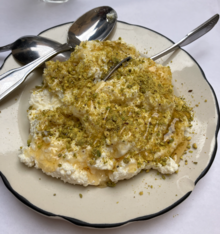

Qishta (Arabic: قِشْطَة, romanized: qišṭa, pronounced [qiʃ.tˤa]), also known as kishta, kashta , ghishta, or ashta, is a dairy coagulated milk product prepared from heated fresh milk and consumed as a dessert. It is found in Southern Mediterranean cuisines, including Lebanese and Egyptian cuisines. It is sometimes scented with orange flower water. Ashta may be served with fruit, used to fill crêpes and pastries, or served with pistachios and sweet syrups. Qishta is "highly perishable" and, if improperly prepared or stored, may be a source of foodborne illness such as listeria. It is similar to other heat-prepared dairy dishes such as kaymak and khoa.
See also
References
- Najib, Mustapha; Hallab, Mohamad Walid; Hallab, Karim; Hallab, Zaher; Delaplace, Guillaume; Hamze, Monzer; Chihib, Nour-Eddine (2020-01-24). "Qishta—A Lebanese Heat Concentrated Dairy Product Characteristics and Production Procedures". Foods. 9 (2): 125. doi:10.3390/foods9020125. ISSN 2304-8158. PMC 7073747. PMID 31991542.
- Najib, Mustapha; Bray, Fabrice; Khelissa, Simon; Flament, Stephanie; Richard, Elodie; El Omari, Khaled; Rolando, Christian; Delaplace, Guillaume; Hamze, Monzer; Chihib, Nour-Eddine (2022-01-01). "Effect of milk heat treatment on molecular interactions during the process of Qishta, a Lebanese dairy product". International Dairy Journal. 124: 105150. doi:10.1016/j.idairyj.2021.105150. ISSN 0958-6946.
- Mefleh, Marina; Darwish, Amira M. Galal; Mudgil, Priti; Maqsood, Sajid; Boukid, Fatma (December 2022). "Traditional Fermented Dairy Products in Southern Mediterranean Countries: From Tradition to Innovation". Fermentation. 8 (12): 743. doi:10.3390/fermentation8120743. ISSN 2311-5637.
- Kobeissi, Hoda. "Atayef with ashta cream (sweet pancake stuffed with clotted cream". SBS. Retrieved 3 December 2020.
- Choueiry, Ramzi (2012-10-01). The Arabian Cookbook: Traditional Arab Cuisine with a Modern Twist. Simon and Schuster. ISBN 978-1-62087-747-0.
- Fatimah (2023-01-11). "Ashta, Middle Eastern Clotted Cream". FalasteeniFoodie. Retrieved 2024-09-16.
- Kassaify, Z. G.; Najjar, M.; Toufelli, I.; Malek, A. (2010). "Microbiological and chemical profile of Lebanese qishta (heat-coagulated milk)". Eastern Mediterranean Health Journal = la Revue de Sante de la Mediterranee Orientale = Al-Majallah Al-Sihhiyah Li-Sharq Al-Mutawassit. 16 (9): 926–931. PMID 21218717. Retrieved 2024-09-16.
- Hassan, Hussein F.; Kassaify, Zeina (2014-03-01). "The risks associated with aflatoxins M1 occurrence in Lebanese dairy products". Food Control. 37: 68–72. doi:10.1016/j.foodcont.2013.08.022. ISSN 0956-7135.
- Harb, C., E. Mouannes, M. Bou Zeidan, A. M. Abdel Nour, and L. Hanna-Wakim. "Foodborne pathogens dilemma in the Mediterranean diet: Case of Lebanon." Journal of Food Processing and Technology 11, no. 10.35248 (2020): 2157-7110.
- Najib, Mustapha, Mohamad Walid Hallab, Karim Hallab, Zaher Hallab, Monzer Hamze, and N. Chihib. "Thermal processing of milk as a main tool in the production of Qishta, Khoa and Kajmak." Journal of Materials and Environmental Sciences Com 11, no. 2 (2020): 294-309.
This food-related article is a stub. You can help Misplaced Pages by expanding it. |